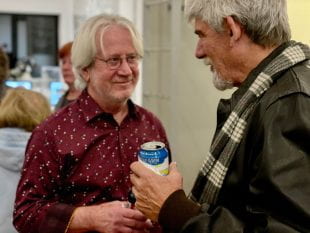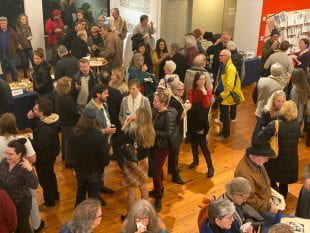Houston’s folk music community reflects on 50 years of Anderson Fair
Every Thursday night, the Rice Cinema screens a new batch of rare films recently recovered from its archives. The weekly series, Low-Fi: Analog Deep Cuts from the Archive, has been drawing a crowd all semester long.

Houston folk legend Vince Bell chatted with fans Nov. 14 before the screening of “For the Sake of the Song.”
But the throng assembled Nov. 14 was the largest yet — a fervent mass of folk music fans who turned out for a screening of “For the Sake of the Song: The Story of Anderson Fair.” Sponsored by the Houston Folk Music Archive and Fondren Library, the evening also included a performance by famed folk artist Vince Bell and a post-documentary Q&A with director Bruce Bryant.
“This is like old home week for me,” said Bryant, who greeted fans one after another during a reception ahead of the screening. His documentary debuted in 2010 at South by Southwest and featured intimate interviews with the musicians and staff — most of them unpaid volunteers — who have kept one of the country’s most beloved live music venues running in Houston for a half-century.
“I started out showing films at Rice and working with James Blue many years ago in the ’60s,” he said, referencing the Rice Media Center’s very first director, hand-picked by Dominique De Menil herself and a legendary filmmaker in his own right.
Longtime Anderson Fair fixture Bell was likewise nostalgic about the role Rice has played in his life.

The evening was sponsored by the Houston Folk Music Archives, housed in Fondren Library’s Woodson Research Center.
One of Houston’s leading folk musicians in the early 1970s, Bell came up with Townes Van Zandt, Guy Clark, Nanci Griffith, Lyle Lovett and Lucinda Williams, playing venues from Anderson Fair and Liberty Hall to arena tours for ZZ Top.
Bell’s star was on the rise before tragedy struck in the form of a drunk driver who barreled into Bell’s car in 1982. Bell nearly died from his injuries and spent the next 10 years relearning every single thing about his life, including how to sing and play the guitar.
“Vince is a poet,” Van Zandt once said of his fellow musician; T Bone Burnett dubbed him a “shaman” upon the release of 2017’s “Ojo.”
Today, both Bell and Bryant have substantial collections in the acclaimed Houston Folk Music Archive housed in Fondren Library’s Woodson Research Center.
Bryant’s collection contains news clippings, audio-visual material and other memorabilia that document his long career as a regional music promoter; he created “The Little Ol’ Show That Comes on After Monty Python,” a staple of Saturday night television in Houston during the 1970’s, and ran The Sweetheart of Texas Concert Hall and Saloon among other ventures.

“This is like old home week for me,” said director Bruce Bryant, flanked by Houston’s folk music community.
Bell’s collection in the Houston Folk Music Archive also contains photographs and flyers, but it gets personal, too: the big, black journal he used before and after his accident, the fancy nameplate from the time he was named Mayor of Montrose during one of Anderson Fair’s yearly street festivals. His collection is regularly mined by Rice faculty and students for everything from songwriting to medical humanities research.
“Both of these projects will outlive me,” Bell said of the documentary and the Rice archive. “And that’s poetic. This is bigger than a hit record, man.”
Soon, it was time for the screening to begin, and Bryant and Bell had to bid farewell to their fans — but only for the duration of the 86-minute documentary.
Filing into the Rice Cinema along with other Anderson Fair devotees was another longtime fixture: Friday night bartender Joy Lewallen, who’s volunteered at the Montrose haunt every week for 47 years.
Like Bell and Bryant, she’d seen the documentary too many times to count since it came out 10 years ago. But the Houston folk music scene is such a vital part of her life, Lewallen said, she’d never miss the opportunity to share the experience of watching it on a true silver screen surrounded by fellow fans.
“Anderson Fair means everything to me,” Lewallen said. “It’s more important to me than my real job that I get paid for. It’s probably the most important thing I’ve ever done.”

